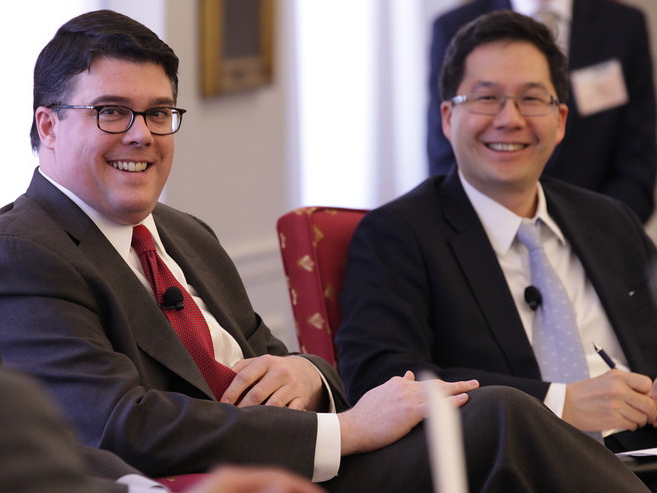CEO Update Live: Recruiters on hiring trends and tips
CEO Update Live: Recruiters on hiring trends and tips
- April 18, 2014 |
-
 CEO Update
CEO Update

Many boards, though not all, are willing to pay more for their next leader; search committees look for passion and cultural fit
April 18, 2014
By Lori Sharn
| Related content Advice for CEOs |
Why do aspiring CEOs with solid credentials fail to make the final cut? In many cases, it's because the candidates have not distinguished themselves in outward-facing roles.
"I consistently hear they're not external enough," especially internal candidates, said Lorraine Lavet, association sector leader at Korn Ferry. "You have to have that opportunity to develop and cultivate the presence and the gravitas."
 Zaniello and Ha |
Lavet spoke April 9 at a forum on executive recruiting, the second of five CEO Update Live events this year. Also offering insights to a packed room of CEO Update members and association executives: Julian Ha of Heidrick & Struggles, Jim Zaniello of Vetted Solutions, and Leonard Pfeiffer of Leonard Pfeiffer & Company.
Search committees are looking for transformational leaders with passion and energy, the panelists said, but who also mesh with the association's culture.
"I think culture eats strategy for breakfast any day," said Ha. "When we present a slate, anyone on that slate can technically do the job. The question is how are they going to work with the organization … and with constituents and members."
The recruiters offered a broad range of insights to the audience, from trends in CEO turnover and pay to how some candidates shoot themselves in the foot.
More churn at the top: Increased turnover is helping to drive up the competition and also the price for the most attractive candidates. Some of the change is due to more demanding boards not renewing their CEOs' contracts, and also from more top executives retiring or moving on.
 Lavet |
Some groups are even experiencing sticker shock upon the departure of longtime leaders who were making far below the current market for talent, Zaniello said.
"It was a hard conversation, because they finally realized what kind of value they were getting out of … these execs for so long," Zaniello said. "They had no idea."
Fast is the new normal: Search committees want strategic thinkers who say on top of trends, and who know how to connect with the next generation of members and leaders. "They don't want the same old, same old," Pfeiffer said. "Everything is moving so much faster."
Be a leader already: Executives eyeing the corner office should seek out alliance-building roles or other more visible, external-facing projects, Lavet said. Another great option is to serve on the boards of other organizations, and take responsibility for strategic planning or organizing an event. "Pick one or two things that you're passionate about," she said.
 Pfeiffer |
Ask strategic questions: Pfeiffer said he likes to hear potential candidates say, "Tell me where the board wants to be in six months, 18 months, three years."
Don't get too familiar: This is especially dangerous for internal candidates. "You may want to talk about ‘How are your kids?' but keep it to a minimum," Lavet said. "Even though you think it may be appropriate, actually it's not. You're interviewing vis-à-vis a slate of people who are not that familiar and they're going to hit it hard. You've got to step up."
Don't be too early: Zaniello said candidates should arrive five to 10 minutes before an interview, not 30. Also, don't dawdle after the interview. "Leaving the room gracefully is so important," Zaniello said.
Follow up: Search committees are struck by how few candidates send thank you notes directly to them, or to the recruiter for them, Zaniello said. Such notes often "tip it in a candidates favor if they're close on somebody," he said.
